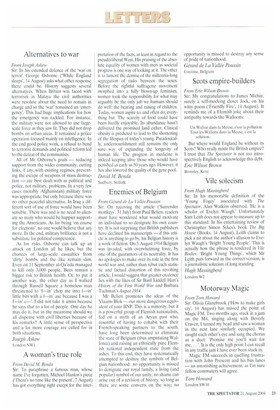Alternatives to war
From Joseph Askew Sir: In his extended defence of the 'war on terror George Osborne (While England sleeps', 14 August) asks what other response there could be. History suggests several alternatives. When Britain was faced with terrorism in Malaya the civil authorities were resolute about the need to remain in charge and so the 'war' remained an 'emergency'. This had huge implications for how the emergency was tackled. For instance, the military were not allowed to use largescale force as they saw fit. They did not drop bombs on urban areas. It remained a police operation focused mainly on intelligence. In the end good police work, a refusal to bend to terrorist demands and political reform led to the defeat of the communists.
All of Mr Osborne's goals reducing support from the wider community, cutting links, if any, with existing regimes, preventing the escape of weapons of mass destruction — are best dealt with as political and police, not military, problems. In a very few cases (notably Afghanistan) military force was appropriate, hut only because there was no other peaceful alternative. In Iraq a different sort of use of force would have been sensible. There was and is no need to alienate so many who would be happier supporting the Americans. As for being 'on course for elections', no one would believe that any more. In the end, military brilliance is not a substitute for political competence.
As for risks, Osborne can talk up an attack on London all he likes, but the chances of large-scale casualties from 'dirty' bombs and the like remain slim. Even on 11 September al-Qa'eda managed to kill only 3,000 people. Bees remain a bigger risk to British health. Or, to put it another way, the other day as I walked through Russell Square a homeless man threatened to `f—in' chop me into f—in' little bits with a f in' axe because I was a f—in' c—'. I did not take it amiss because he says that to a lot of people. One day he may do it, but in the meantime should we all dispense with civil liberties because of his remarks? A little sense of perspective and a lot more courage are called for in both situations.
Joseph Askew
London NW I


























































 Previous page
Previous page